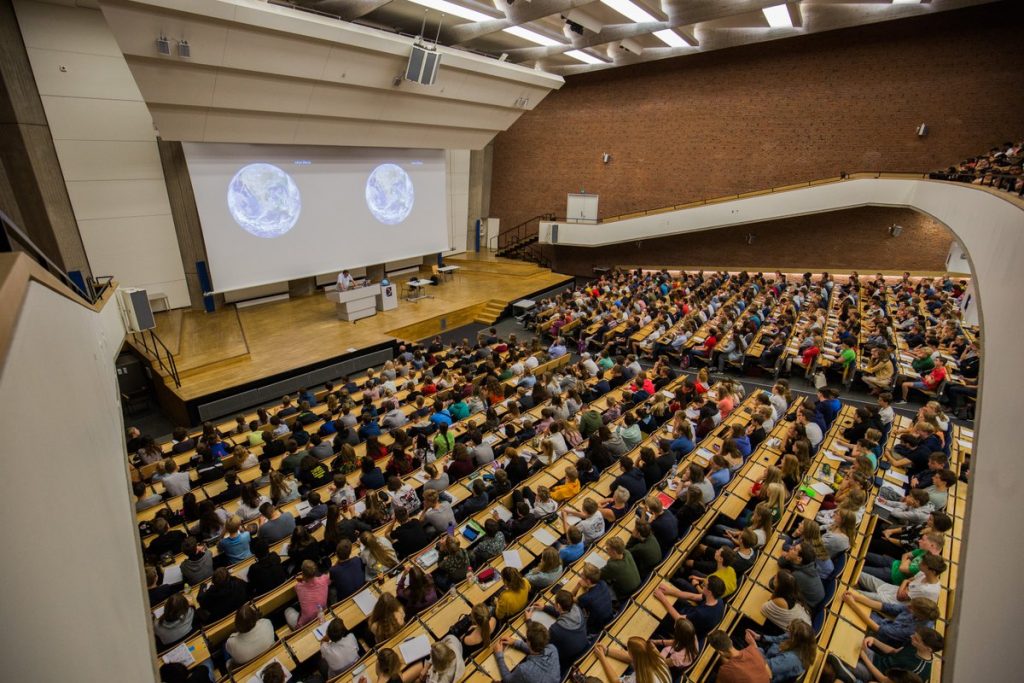Highlights of the European Planetary Science Congress (EPSC) 2018
We had a fantastic meeting in Berlin at EPSC 2018! Here is our pick of some of the highlights of the week:
- The biggest EPSC to date! EPSC 2018 was our largest stand-alone meeting to date with 1018 participants from 44 countries, breaking the record of 960 at EPSC 2013 in London. Next year, we will be bigger still as we join forces with the American Astronomical Society’s Division of Planetary Sciences (DPS) for our third EPSC-DPS joint meeting. Join us in Geneva, Switzerland from 15 to 20 September 2019.

EPSC 2018 took place from 16-21 September 2018 at TU Berlin. Credit: L. Giacomini/Europlanet -
The launch of the Europlanet Society. It was fitting that Berlin, the city where we launched EPSC back in 2006, was the venue for the launch of the Europlanet Society, which will provide a sustainable structure to support planetary science in Europe for decades to come. The Society is open to individual and institutional members. If you want to join, the membership sign-up form will go live in early November.

The General Assembly at EPSC 2018 approves the launch of the Europlanet Society. Credit: L. Giacomini/Europlanet -
Science Flash Challenge. Once again, early career scientists were challenged to present their work in a fun and original way in 180 seconds with just one slide. Congratulations to the winners of Science Flash 2018: Julia Marin-Yaseli (Spain), Giovanni Poggiali (Italy) and Adhithiyan Neduncheran (India).

The winners of the EPSC Science Flash Challenge 2018. Credit: Europlanet -
BepiColombo. One month before BepiColombo’s planned launch, the ESA-JAXA mission was showcased at EPSC on ESA’s exhibition stand, in the Mercury sessions and at a press conference with the BepiColombo team.

Joe Zender and Johannes Benkhoff at the ESA stand with the BepiColombo model. Credit: ESA -
OpenPlanetary Data Café. We hope you grabbed a coffee and joined our workshops on Tuesday and Thursday for discussions, tutorials, hacks and talks on data analysis tools and techniques.
-
Mars! EPSC 2018 had two days of sessions relating to ESA’s ExoMars Trace Gas Orbiter (TGO) mission, as well as a day of sessions celebrating 15 years of Mars Express. Although many TGO results are still being prepared for publication, we were able to share some new images from TGO and Mars Express at EPSC, in addition to views of a dust storm and results from the FREND instrument about the radiation risks for future travellers to Mars.

TGO CaSSIS image of frosty crater on Mars. Credit: ESA/Roscosmos/CaSSIS, CC BY-SA 3.0 IGO -
Astrobiology. In advance of the European Astrobiology Network Association (EANA) 2018 meeting taking place in Berlin the following week, Friday 21 September was astrobiology day at EPSC 2018. A White Paper on “Astrobiology and Society in Europe Today” was presented in sessions and in a press conference, along with plans for a European Astrobiology Institute.

Press briefing on Astrobiology and Society in Europe Today. Credit: Europlanet -
Agency Night. The first full day of EPSC 2018 wrapped up with Agency Night. The session was moderated by Jean-Pierre Lebreton, EPSC Chair and Athena Coustenis (Europlanet Deputy Coordinator) and included speakers from DLR, ESA, NASA and IKI.
-
Inspiring the next generation. On Wednesday 19 September, 1000 teenagers participated in a special session at EPSC 2018 on planetary research, space missions and a talk by astronaut Gerhard Thiele.

EPSC 2018 schools event, organised by TU Berlin and DLR. Credit: TU Berlin/PR/Oana Popa -
Prizes. Congratulations to Francis Nimmo, who was awarded the 2018 Farinella Prize for his work on Giant Planets’ Satellite Systems and Amara Graps, who was awarded the Europlanet Prize for Public Engagement at EPSC 2018

Francis Nimmo was awarded the Farinella Prize by the Chair of the EPSC Scientific Organising Committee, Maria Cristina De Sanctis. Credit: A. Postiglione/Europlanet -
The EPSC team! Many thanks to Mario Ebel of Copernicus and his team of conference assistants, the EPSC Executive Committee, the Scientific Organising Committee and the Local Organising Committee for making EPSC 2018 such a successful meeting!



